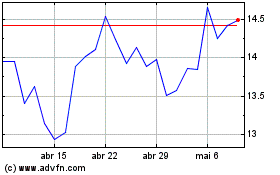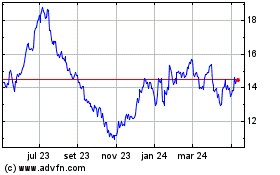By Doug Cameron and Alison Sider
United Airlines Holding Inc. said Oscar Munoz will step down as
chief executive after four-and-a-half years, and tapped an industry
veteran from within its ranks to continue one of the sector's
biggest turnarounds.
Scott Kirby, who joined United from American Airlines Group Inc.
three years ago, will take over the top job in May, the carrier
said on Thursday. The leadership change follows sustained
improvements in the company's performance, with an aggressive
growth strategy overseen by Mr. Kirby making it the nation's
second-largest carrier by traffic and stronger profits helping its
shares outperform rivals.
Mr. Kirby, 52 years old, one of the industry's best-known
executives, will take over as United and other carriers face a
series of challenges including economic headwinds, cost pressures
from upcoming new labor deals and the global grounding of the
Boeing Co. 737 MAX. United has 14 of the jets and was due to take
dozens more, crimping its growth plans.
United's shares slipped 0.5% to $87.73 in midday trading, with
American and Delta Air Lines Inc. also lower. Under Mr. Munoz's
tenure, which started in September 2015, United's shares have risen
by more than 50%, doubling the gains posted over the same period by
a stock index of airline carriers.
In recent years, Mr. Munoz, 60, and Mr. Kirby worked to expand
its domestic routes to reverse years of market share losses and
improve troubled relations with employees. Mr. Kirby said in a
video message to employees that he will continue to follow that
strategy.
Mr. Munoz lacked deep experience in the airline industry. Mr.
Kirby has a reputation among investors and analysts as one of the
most detail-orientated airline executives, and had made no secret
of his ambition to lead a major airline. Mr. Munoz will serve as
executive chairman for a year.
Mr. Kirby, 51 years old, has also made missteps, including a new
employee bonus plan at United that was abandoned after staff
complained the move to a lottery system was unfair.
When Mr. Munoz was appointed CEO, he inherited a troubled
airline. United had struggled since its 2010 merger with
Continental Airlines. Operations were strained, employees were
bitter, and United's reputation with customers was in shambles. His
predecessor, Jeff Smisek, had been pushed out by the board during a
federal probe of United's dealings with the operator of its Newark,
N.J., hub.
Mr. Munoz had served for years on the board of Continental and
later of United Continental, but he didn't have any experience
running a commercial airline. He had held financial and strategic
positions at AT&T Inc., Coca-Cola Co. and PepsiCo Inc. before
joining railroad operator CSX Corp.
At the helm of United, Mr. Munoz took swift action to lift
workforce morale, make operations more reliable and improve
customer service. He also brought in outside executives to bolster
United's leadership ranks.
Mr. Munoz spends much of the year on the road visiting
employees, including dropping in to chat with ground workers at
airports hit by extreme weather like last winter's polar vortex in
Chicago. When Mr. Munoz appeared at a party hosted by United in
Chicago recently, he could hardly take a few steps without being
stopped by employees wanting to shake his hand or pose for a
photo.
Less than six weeks after his appointment he suffered a heart
attack in Chicago. Three months later he received a heart
transplant, returning to work in early 2016.
While he was recovering, two hedge funds started a campaign to
win seats on United's board and install former Continental CEO
Gordon Bethune as nonexecutive chairman, alleging that the
company's board and management was ill-equipped to turn the airline
around.
United and the activists struck a deal in April of 2016. United
agreed to appoint two directors chosen by the activists to its
board along with a third mutually agreed on director. United also
elected Robert Milton, a former Air Canada chief executive, as
nonexecutive chairman.
A year later, United and Mr. Munoz came under intense scrutiny
after a 69-year-old passenger was dragged bloodied and screaming
off a United Express flight in Chicago. A video of the incident
went viral. Mr. Munoz's initial response -- defending his staff and
describing 69-year-old David Dao as disruptive -- touched off the
airline's biggest public-relations crisis in years.
Mr. Munoz later apologized repeatedly and profusely for an
incident he described as a "failure of epic proportions" and a
"breach of public trust."
Some passengers still threatened to boycott the airline and
called for him to resign. United's board decided not to give Mr.
Munoz the role of chairman as it had planned for him to take
alongside his CEO role, and changed its executive compensation
incentives to focus more on customer service.
United's current chairman, Jane Garvey, will retire from the
board in May. Ted Philip, who joined the board in July 2016, will
become lead independent director.
Write to Doug Cameron at doug.cameron@wsj.com and Alison Sider
at alison.sider@wsj.com
(END) Dow Jones Newswires
December 05, 2019 11:58 ET (16:58 GMT)
Copyright (c) 2019 Dow Jones & Company, Inc.
American Airlines (NASDAQ:AAL)
Gráfico Histórico do Ativo
De Mar 2024 até Abr 2024

American Airlines (NASDAQ:AAL)
Gráfico Histórico do Ativo
De Abr 2023 até Abr 2024
